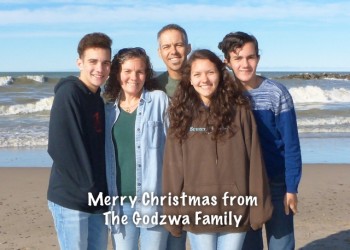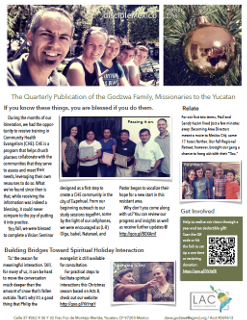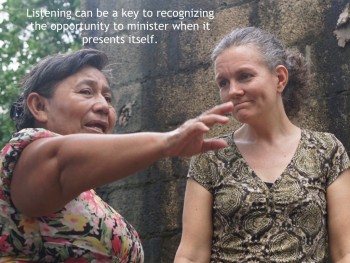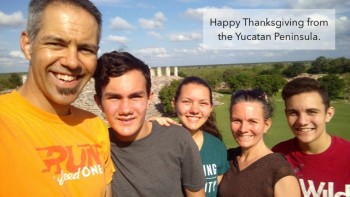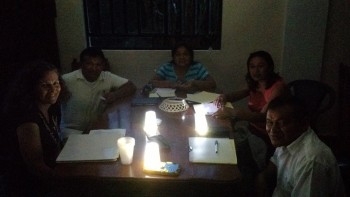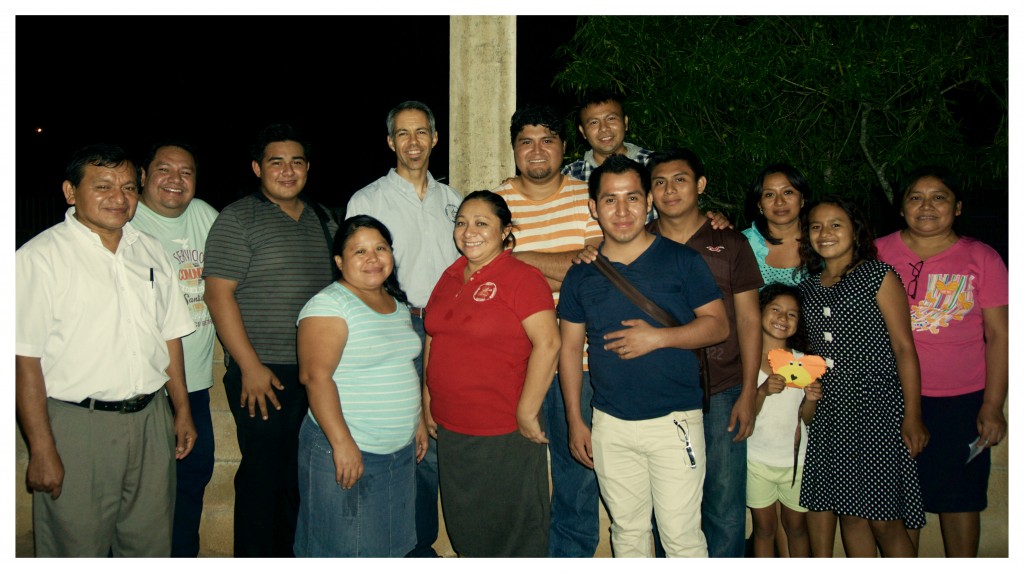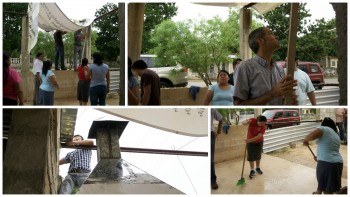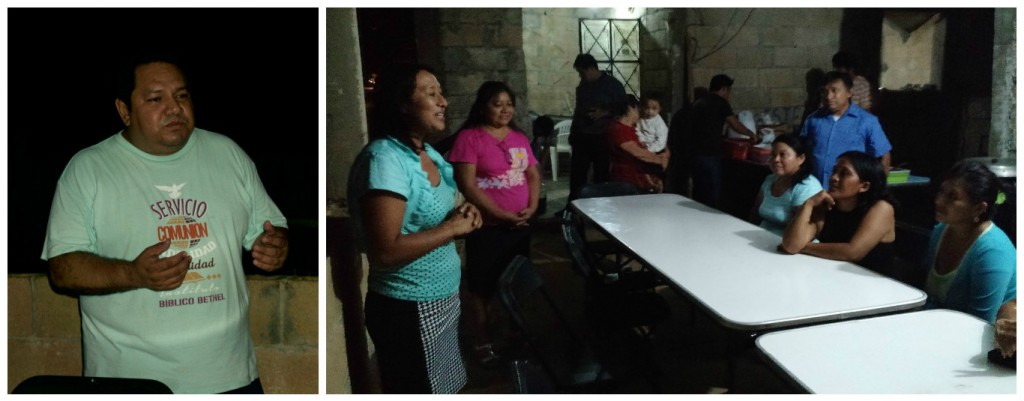David and Kelly
Rebekah, Joseph, and Jonathan
Temperatures in the lower sixties on the Yucatán mean that winter is at hand! With the change in season comes the opportunity to inform you about what’s been going on since our arrival in Mérida in August.
Click on the image, or hit the link and you’ll get up-to-date on:
- Our latest progress with Community Health Evangelism.
- Methods for getting the most out of your holiday interactions,
- And updates from our gang as they navigate life again in Mexico.
Remember, our newsletter in PDF format viewable in Adobe Reader. If you don’t have Adobe Reader installed, you can download it free here:
Tags: AGCHE, Church planting, Evangelism
Christmas is all about Christ, isn’t it? At least that was the core of the debate over the use of “Xmas,” a popular one in my childhood. Even now, with the plurality of holidays that seem to clutter the end of the year, the thoughts of many still turn to that event that split the calendar that we still use in two–the birth of Jesus.
Still, even though so many reflect on this day when God came near, it often seems so hard to enter into the spiritual interactions that we long for. With so many relatives, friends, and even strangers gathered together, the opportunities to turn the conversation to the spirit of the season, God’s activity in the here and now, seem to abound. Nevertheless, for many of us, it can be hard to move the conversation much deeper than the amount of snow that’s fallen outside.
What’s one to do? How can we interact with one another in a way that the season or any day truly deserves? How can we invite God into our conversations this Christmas?
I believe that the Bible, specifically the book of Acts, provides a template that we can use to direct our activities throughout the holidays and beyond, and it’s my prayer that this insight from Scripture will help you and your family put Christ back into Christmas, even it if be only in your circle of influence. First let’s look to the text:
Acts 8:26-401
26 As for Philip, an angel of the Lord said to him, “Go south down the desert road that runs from Jerusalem to Gaza.” 27 So he started out, and he met the treasurer of Ethiopia, a eunuch of great authority under the Kandake, the queen of Ethiopia. The eunuch had gone to Jerusalem to worship, 28 and he was now returning. Seated in his carriage, he was reading aloud from the book of the prophet Isaiah.
29 The Holy Spirit said to Philip, “Go over and walk along beside the carriage.”
30 Philip ran over and heard the man reading from the prophet Isaiah. Philip asked, “Do you understand what you are reading?”
31 The man replied, “How can I, unless someone instructs me?” And he urged Philip to come up into the carriage and sit with him.
32 The passage of Scripture he had been reading was this:
“He was led like a sheep to the slaughter.
And as a lamb is silent before the shearers,
he did not open his mouth.
33 He was humiliated and received no justice.
Who can speak of his descendants?
For his life was taken from the earth.”
34 The eunuch asked Philip, “Tell me, was the prophet talking about himself or someone else?” 35 So beginning with this same Scripture, Philip told him the Good News about Jesus.
36 As they rode along, they came to some water, and the eunuch said, “Look! There’s some water! Why can’t I be baptized?” 38 He ordered the carriage to stop, and they went down into the water, and Philip baptized him.
39 When they came up out of the water, the Spirit of the Lord snatched Philip away. The eunuch never saw him again but went on his way rejoicing. 40 Meanwhile, Philip found himself farther north at the town of Azotus. He preached the Good News there and in every town along the way until he came to Caesarea.
Now for those of you who are headed out the door to that office party or holiday potluck and are just interested in the steps to take to facilitate spiritual interaction here they are:
1. Pray for direction. (v.26, 29)
2. Obey the direction your receive. (v.27, 30)
3. Observe; hear the person’s story. (v.30)
4. Ask about their impressions, understanding, or need. (v.30)
5. Begin with the thoughts expressed. (v.35)
6. Explain God’s place in their story. (v.35)
7. Allow for the other to respond. (v.36)
For those of you with a bit more time, I offer some explanation:
The above passage is an excerpt of the account of Philip “the evangelist,” one of the seven deacons, “men full of the Holy Spirit and wisdom,” chosen in Acts chapter 6 to assist the apostles with equal food distribution among the church’s dependent widows. Prior to this passage, we see him, having fled the persecution of the church carried out by Saul of Tarsus, preaching in Samaria and carrying out a rather successful ministry. Under his work, the residents of this community received the message of Jesus, and many believed and were baptized after seeing the miraculous signs that accompanied his ministry.
Therefore, this encounter with the Ethiopian Eunuch is a bit unexpected. At the center of a successful outreach, we would expect Philip to remain in order to consolidate the work, but, apparently, God had other plans. This leads us to the first step in building bridges toward spiritual interactions:
Pray for direction: Now while it is not overtly stated how Philip received his message in verse 26 to go to the desert road, we can assume that he was at least in an attitude that facilitated spiritual direction. In my mind, that points to an active devotional life, one which enables us to hear from God and recognize his voice.
This can be a big hurdle for many of us during the holiday season. With additional tasks on our list and events to attend, it can be tempting relegate to our daily time with God to the perfunctory prayers offered up at mealtimes or perhaps during the religious events that dot our calendar, but with Philip, we see just how essential his prayer life truly was. It was the catalyst that turned his attention to an encounter that would change the life of one man and perhaps opened an entire nation to the message of the gospel.2 Our prayers, as well, may be just what we need to prepare us to cooperate with God in the life of a loved one or sensitize us to a need lying just below the surface.
But how should we pray? A retired missionary, Lloyd Marsh, offers advice on this point. During his instruction on helping others to receive the Baptism of the Holy Spirit, he would teach them to ask God, “What do you want to do?” God has a plan for the people that we meet, we should be asking Him how He would like us to cooperate with Him in fulfilling that plan.
Obey the direction you receive. Some would argue that this point is unnecessary, as one should obviously do what God tells us to do. Nevertheless, many of us could probably recall the myriad opportunities that we had allowed to slip by for fear of awkwardness or rejection. However, determining to act upon the message that we receive or the impression that we feel can help us tremendously when the event arises.
In the case of Philip, we see two occasions when he received specific direction (v.26 and v.30), and, in each case, action immediately followed. It was his obedience to the direction that he received that made the real difference in the situation.
Likewise, although we pray, unless we take action, no difference will be made. A little book, The Ten Second Rule has been helpful to both Kelly and myself as we try to overcome our natural reluctance to take the next step in obedience. The basic premise of the book revolves around this idea: “Just do the next thing you’re reasonably certain Jesus wants you to do,” and do it in ten seconds or less.
Perhaps it will be a direction to speak with that uncle you’ve always avoided or an impression to get to know that other family during the school presentation that will lead to an unexpected blessing. You never know. One thing, however, should be determined in advance: inaction isn’t an option.
Observe; hear the person’s story. This is perhaps the biggest gift that we can give this holiday season, especially when our conversations have tendency to turn into competitions instead of true giving and receiving, if this Brian Regan video is any indication. James 1:19 says it best, “Understand this, my dear brothers and sisters: You must all be quick to listen, slow to speak, and slow to get angry.”
This is precisely what we see in Philip’s encounter with the Ethiopian. Having obeyed the command to walk beside the carriage, he was able to hear that the eunuch was reading from the 53rd chapter of Isaiah, the prophecy of the “Suffering Servant,” one that Jesus fulfilled with his crucifixion and death. This observation supplied the explanation behind his unexpected direction and provided the opportunity that he needed to be able to intervene appropriately in the life of this high-ranking official.
As we spend time with others this holiday season, it could be a look or a sigh that, when noticed, might bring about an area of need where we could minister. On the other hand, a sermon or a reading from the Bible might generate an opportunity for sharing. The difference will be made when we intentionally choose to observe and develop our desire to bless others.
Ask about their impressions, understanding, or need. Sometimes, statements are made and are allowed to fall to the ground. Philip, having heard the scripture, could have walked away, satisfied that others, too, were reading the word of God. He didn’t. He asked a simple question which served to catapult the conversation into an explanation of the gospel: “Do you understand what you are reading?” (v.30)
We too can ask simple questions that may lead to deeper conversations. Questions like, “Why did you say that?” or “How did that make you feel?” may lead those around us to open up in a way that they normally wouldn’t. This is especially effective if they see that we’ve taken a genuine interest in the conversation that we’ve begun with them.
Begin with the thoughts expressed. When the opportunity does come for us to turn things to spiritual matters, a canned sermon, or a memorized script shouldn’t be our fall back. Instead, we should use Philip as our guide. He began with that same Scripture from Isaiah 53 to explain the gospel to the Ethiopian. It effectively answered the man’s question and stimulated his faith.
An admission of anxiety might allow us to share about God’s peace. An expression of loneliness might give us the opportunity to share about God sending us Immanuel “God with us” (further emphasized by our own presence with the person to whom we are ministering.) In each situation, we validate the person by hearing and responding to their situation.
Explain God’s place in their story. With Philip, the progression was natural. A scripture lead to an explanation of the ministry of the Messiah. For us, it may take a bit more thought, but the key lies in viewing our lives not as segmented compartments but as a unified whole. Once we allow God to encompass and invade every area of our own lives, connecting the current situation expressed with the activity of God in the person’s life will come more naturally.
Allow the other person to respond. Philip, after sharing his explanation, gave room for the eunuch to express his belief. His desire to be baptized signaled his acceptance of the explanation and his willingness to be initiated as a disciple of the one in whom he believed. Allowing room for others to express their reaction to our explanations may result in a request for prayer, an invite to talk further, or even, like in the case of Philip, a chance to lead someone to the Lord. The key is to make space in the conversation and to invite their response to your explanation.
Can move past superficiality this holiday season? I believe that the answer is yes, and the template that Philip models for us in Acts 8:26-40 shows us how we can. May the Lord help us to put this knowledge into action as we gather with others this Christmas and all throughout the coming year.
1 Scripture quotations are taken from the Holy Bible, New Living Translation, copyright ©1996, 2004, 2007 by Tyndale House Foundation. Used by permission of Tyndale House Publishers, Inc., Carol Stream, Illinois 60188. All rights reserved.
2Irenaeus states that the Ethiopian eunuch was “sent into the regions of Ethiopia, to preach what he had himself believed.” CHURCH FATHERS: Against Heresies, III.12 (St. Irenaeus). Ed. Kevin Knight. New Advent. Web. 8 Dec. 2015. https://www.newadvent.org/fathers/0103312.htm
Tags: Christmas, Evangelism
I’m sitting here writing beginning to write these thoughts on Giving Tuesday, the day that we are reminded that it is more blessed to give than to receive. Still, as I look at my inbox, I see only four messages related to Giving Tuesday, while Black Friday and Cyber Monday offers are there by the dozen, and those are the ones left over after my first attempt to clear them away.
The first question I ask is, “How did I get signed up for so much junk mail?” but then I get a bit more philosophical about the situation. What is it that these companies know about us that causes them to bombard us with dozens of ways to accumulate more? Why does Thanksgiving seem more like the perfunctory calm before the storm of capitalist activity that is Black Friday instead of a day to truly celebrate all of the blessings that money can’t buy?
In the last session of our CHE vision seminar, we uncovered a few clues. As we talked about worldview, or the grid through which all of us interpret reality, we uncovered the fact that there are lies, or false building blocks, that can weaken a community and hinder its growth.
As we talked within the group, we began to see the effects of the idea of individualism, or the celebration of individual freedom over and above the well-being of the group. As we teased out the thought that personal happiness had become for many the ultimate goal, we found it to be quite a weighty anchor that slows the progress that we try to make in any community no matter how small.
The effects of prioritizing personal happiness could be seen in all sorts of evils from petty theft to marital infidelity. Besides, what couldn’t be justified if we have convinced ourselves that we’re only taking what we deserve?
The problem is that, over time, these cracks of justification weaken the foundation of trust established in the group. These fissures, then, if left unchecked, lead to the group’s ultimate demise. The testimony to this fact can be seen in any number of broken homes, ruined churches, or fractured communities.
So why is it that we find so many offers choking our inboxes at the start of this Christmas season? Perhaps it’s because we’ve failed to recognize the fact that we’ve been building with some false building blocks in our own lives. Perhaps we’ve fallen prey to the lie that inflates the importance of our personal happiness, telling us that each purchase we make, and each desire we satisfy, will move us closer to that goal. Or perhaps, as my wife says, we’ve simply not taken the time to unsubscribe ourselves from junk email lists.
Whatever the case, during this season of giving, let’s try to set aside some of those false building blocks we’re tempted to reach for. Let’s strengthen our communities with quality materials that carry an eternal guarantee. Let’s build one another up with the faith, hope, and love that Christ embodied on this earth and offers to all who would follow Him today.
Tags: AGCHE, Church planting, Family
In this season of gratitude, we want you to know what an honor it is for us to serve as your representatives in ministry to Mexico. Thank you for your support in the fulfillment of the vision of the Yucatan Peninsula full of churches, diverse in class, status, education, and language but united in their love for the Lord and each other.
Henry David Thoreau wrote in his book, Walden, that “The mass of men lead lives of quiet desperation.1” His was the idea that people (men and women included) live their lives in a silent mourning of opportunities missed, unfulfilled expectations, and dead dreams.
While I’m not one to argue with Thoreau about the ubiquity of desperation, I wonder if that desperation remains a silent one. I’d suggest that the Internet has made the life of quiet desperation a thing of the past. What once was repressed or distracted or drown out now seems to be spewing forth in a torrent of comments, posts, tweets. The ready access to communication, as close as our pocket or even our wrist and the seeming anonymity of it all makes voicing our desperation a tempting prospect that is as easy to do as it has ever been.
On one hand, it’s concerning. Never has so much information, sometimes about our deepest and darkest secrets been so easy to access. It’s enough to make any responsible parent think long and hard about what their children might be reading and viewing. Still, what if there was a productive outlet for people to express this desperation, and what could it mean for the church if we listened to what was being said?
Well, there does exist just such a place. It’s called journeyanswers.com (respuestasdelavida.com in Spanish), and it’s provided by Network211, a ministry focused on using creative means to share the gospel with the whole world. There, on those sites and others like them in 10 different languages, people can express their frustrations and receive hope for their situation. They can express their desperation and get an answer in return.
That’s right, those who are reaching out are finding help through the Internet. Each decision made, question asked, or prayer request submitted is queued to connectors, providing biblical responses, suggesting resources, and connecting virtual pilgrims to real faith communities. I know, because I’m one of them.
Since August of this year, I’ve entered into partnership with Network211 in order to organize the response to those reaching out for spiritual answers in Mexico. Our goal is to provide rapid, caring support for those in need, directing them as many of them take their first, faltering steps toward God. Since that time, our growing team has responded to over 250 inquiries, speaking into dozens of desperate situations, welcoming many into relationship with Christ and connecting all to resources designed to help them grow.
Now some of you may remark, “That’s all well and good, but how does this fit into your vision for filling the Yucatán with churches? Good question. This partnership is a long term evangelistic emphasis. As we promote the Respuestas de la Vida website throughout the Yucatán, more of our site visitors will come from this area. We, in turn, can respond to those inquiries and, when able, our team can offer home group Bible studies to those who are interested. Already, we’ve been able to refer two Mexicans to spiritual communities. Just think of the possibilities when Yucatecos begin to utilize this rich resource.
The world, as Thoreau has said, is full of desperate people, but these desperate people are silent no longer. Still, through Network211 and the ministry of Journey Answers and Respuestas de la Vida, the church is listening, and we’re not just listening, we’re helping.
1Thoreau, Henry D. Walden. Boston: Houghton and Mifflin, 1893. The Walden Woods Project. https://www.walden.org/documents/file/Library/Thoreau/writings/Writings1906/02Walden/Walden01Economy.pdf. Accessed 11/13/2015.
Photo credit: Despair by Lloyd Morgan is licensed under CC BY 2.0
Tags: Church planting, Evangelism, Network211
Last night, Friday the 13th, brought it’s share of unlucky circumstances as we began the Community Health Evangelism (CHE) journey in Tixpehual, Yucatan. It began with a rainstorm, innundating roads and complicating our arrival at the community. It continued as we arrived at our meeting place to find that the power was out in the entire village. (We were meeting at a church in Kilinché, a neighboring community to Tixpehual.) Needless to say, things were not necessarily working out as any of us had expected.
But far from being “bad omens,” we took them as an initial test of our resolve to see CHE concepts work from the very beginning. The photo above shows how we were able to work together to solve our electrical problem. We took out our cellphones and used plastic cups to create crude table lamps so that we could lead our groups members through the discovery of the CHE concepts.Â
As we progressed, it seemed fitting. It was a baby step, so to speak, that we were able to take. Certainly the situations that we will face as we progress with CHE will be larger and more complex, but it was gratifying to see, in the face of this first challenge, that we did not fail; we did not cancel. We worked together, we pooled our resources, and we accomplished our objective.Â
So, on this first night, in the midst of some trying circumstances, we took the time to get to know one another. We discovered what health and community truly mean, and we began to tease out the concepts that serve as the foundation of the CHE program, but it was the soft glow of our makeshift cellphone lamps that became the memorable moment. They were the impromptu object lesson that the ideas that we were sharing can and will work. Â They were a small “win” in anticipation of many more in this CHE journey that we’ve begun in Tixpehual.
Tags: AGCHE, Church planting, team ministry
I sat there in the audience as I heard the report. It was Missions Sunday and we were hearing from a recently returned missions intern. Like many other missions interns she had been sent to a remote, indigenous village. However, in this particular case, the work in that village had been going on there for 20+ years. She also reported that village was nearly 50% Christian. This information made me scratch my head. Why would she be sent there? She was sent there because the church had been without a pastor for two years. There was no one who had wanted to “go” to that poor, remote village.
I wondered if I was the only one hearing her talk. I wanted to ask, after twenty years, weren’t there those among the village qualified to take up leadership of the congregation, especially if half of the population professed Christ? Had the discipleship process been so slow that, even after all that time, there was no one who could serve as the pastor? By calling on a missionary to fulfill that role, were they dooming the work to remain a foreign one, one that would continue to need outside resources to even survive?
Still, as I reflect on some of the works that we’ve observed, even had a hand in planning, I have to admit, there are several that are dependent on foreign resources and personnel just to stay afloat. And while, in many of those cases, we can marvel at the testimony of change in individual lives, the organization fails to fulfill its potential, because it’s been held back by its “overprotective parents” or its unsustainable model.
“There’s got to be a better way,” we’ve told ourselves, and we believe we’ve found that way. In our summer 2015 newsletter, I spoke about a training seminar that Kelly had taken called “CHE.” Since that time, both of us have had the opportunity to receive training, and we’re now at the point of putting our training into practice.
CHE or Community Health Evangelism is a system that enables a community to take responsibility for their own holistic well-being (physical, emotional, and spiritual). Limiting outside resources, CHE empowers participants to discover biblical personal wellness and strive to make their community a better place to live. It’s decidedly low-tech with a view to invite grassroots participation from the very beginning and to train up leaders to take over the program soon after it begins.
Since our time in Tixpehual, seeing the slow progress that the A/G has made in that town, we’ve asked ourselves if that community of roughly 3400 people would be a good place to begin a CHE community. We’ve investigated and determined that the interest was there to move forward. This coming Friday, November 13, we begin a vision seminar designed to explain CHE’s potential.
Can we guarantee that CHE will be the answer to the slow, halting progress in Tixpehual? In a word, no, but we can begin well through CHE. Through it we can help its leaders and participants to understand that the gospel can and will grow. It will grow when we realize that it is an integrated message that brings wellness to the whole person and when we personally engage in applying that message to our situation.
Tags: AGCHE, Discipleship, Evangelism, Missions
 We know that it’s not always possible for every missionary to return to the same place for three consecutive terms. There are many factors that cause them to change fields or even entire regions. Neveretheless, we can’t overstate the blessing that it is for us to be able to return to the Yucatan and reconnect with the work we’d begun and the people with whom we’d collaborated.
We know that it’s not always possible for every missionary to return to the same place for three consecutive terms. There are many factors that cause them to change fields or even entire regions. Neveretheless, we can’t overstate the blessing that it is for us to be able to return to the Yucatan and reconnect with the work we’d begun and the people with whom we’d collaborated.
In August, we were blessed to see the reestablished church in Tigre Grande, planted by Rangel and Claudia Vázquez, recieve their new pastor, Yani May, a former student of mine and graduate of the Bible Institute. Kelly and I had the privilege of praying for her during her commissioning service.
In September, I (David) was able to return to the work in the Bible Institute, having been invited to help in the formation of the next generation of Assemblies of God ministers. It’s been a joy to take up the class of Evangelism again, sharing my desire to reach the lost with both new and continuing students, and walking with them to facilitate their projects that have been designed to fulfill that goal.
Here in October, the reunions continued as we had the opportunity to preach for and then share a meal with Guadalupe Campos and her husband José, pastors of the church plant in Sierra Papacal. It was wonderful to encourage their congregation, retrace the events of the past year, as well as gain a deeper appreciation for their passion for the ministry as they continue their work in spite of some tremendous obstacles.
Thank you then for your prayers and support. They’ve helped us to return to Mexico. They’ve made possible these reunions and have given opportunity for new connections, connections that will enable us to fulfill the vision of the Yucatan Peninsula full of churches diverse in class, status, education, and language, but united in their love for the Lord and each other.
Tags: Evangelism, Instituto Biblico Bethel, Sierra Papacal, Vision/Mission
The book of Ezra, chapter 3, recounts the rebuilding of the temple when the Israelite had returned from exile. As Zerubbabel directed the final stones into place to finish the foundations of the temple, there was an interesting occurrence. The people lifted up a shout of rejoicing, thanking God for his help, but, at the same time, the elder priests and levites wept aloud, having remembered the old temple’s former magnificence. Zechariah speaks to these leaders, those who had been disappointed with the progress achieved. He says, “Do not despise these small beginnings, for the Lord rejoices to see the work begin…” (Zechariah 7:10).
Tixpehual is a work in revitalization. Although the Assemblies of God has an almost 30 year history in that city, the work has failed to take root. This past Friday, however, eight of my students from Instituto Bíblico Bethel began preparing the foundations for a new effort.
It all began under threatening skies. We had been praying for all aspects of the event, from the participants to the invitees, to the weather. Still, by the time we had left Merida, the heavens had opened, producing a steady downpour. We arrived to a town square literally under water! The conditions were certainly not in our favor.
The first order of business was to prepare a relatively dry meeting place. Thankfully, Pastor Castillo, husband of the new leader of the work had come prepared. Two old event banners he had brought with him from Mérida were fashioned into an improvised roof while my students Abisai and Eric did their best impersonation of Spider Man, climbing the walls to set them in place.
The next step was to remind the neighbors that, in spite of the rain, the event was still on. We passed through the neighborhood, door to door, speaking with those who had received the printed announcements the Wednesday before. Still, 5:00, the scheduled time of the event, came and went without so much as a single attendee. Things were beginning to get tense.
A new group was sent out, reminders were given, but people did not seem to be moving toward the house where we were meeting. Then we were told: “When you announce a time, it means that the event will start an hour later.” Sure enough, the people came.
By the time the event was underway the rain had passed, and five families, moms with their kids had arrived at the house. Women were learning about making “pastel de galleta” a cake out of crackers, at the same time that they were hearing testimonies of God’s work in students’, (Maribel and Geydi) lives. Next door, their children were jumping, singing, working on crafts, and listen to a message about the God who loves them told by Abner and Abisai.
The culmination of the evening came just before dinner. The ladies sat at a table prepared for them, while Jorge shared scripture and asked if we could pray with them. All of them accepted, and not only did they allow us to take down their names and addresses, they opened up to us, letting us know their struggles and concerns. That prayer time was a special moment.
As we began to reflect on our experiences, many of the students shared that there was a reluctance expressed by many of the ladies as they deliberated attending the event. Some of them had prior experiences gathering at such activities and knew the abandonment that comes when, for one reason or another, the church, or the support group, or the workshop closes its doors. The conclusion: the work must go on.
We’re so thankful, then, that we were able to install Pastor and his wife Olga as the new leaders of the cell group that is being restarted in Tixpehual. Starting this weekend, they will be available Saturdays and Sundays, visiting, holding Bible studies and encouraging the unsaved to trust in Jesus and Christians to deepen their walk with him.
Following the event, there were those who had been disappointed that more hadn’t arrived, but Isabel, the owner of the house was very encouraged. She expressed her gratefulness for the opportunity to use her home to be able to serve and speak into the lives of her neighbors. She was thankful for this small beginning in Tixpehual and hopeful for a brighter future.
Did you enjoy the story? Be sure to look at our photo gallery of these shots and others, taken by Rebekah Godzwa.
Tags: AGCHE, Church planting, Evangelism, team ministry

